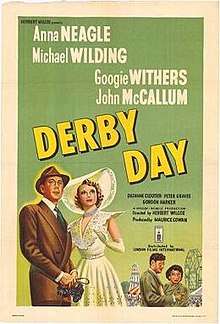Derby Day (1952 film)
Derby Day is a 1952 British drama film directed by Herbert Wilcox and starring Anna Neagle, Michael Wilding, Googie Withers, John McCallum, Peter Graves, Suzanne Cloutier and Gordon Harker. An ensemble piece, it portrays several characters on their way to the Derby Day races at Epsom Downs Racecourse. It was an attempt to revive the success that Neagle and Wilding had previously had opposite each other, but it failed in this regard.[2] In an effort to promote the film Wilcox arranged for Neagle to launch the film at the 1952 Epsom Derby.[3] In the United States it was released as Four against Fate.
| Derby Day | |
|---|---|
 | |
| Directed by | Herbert Wilcox |
| Produced by | Maurice Cowan Hebert Wilcox |
| Written by | Arthur Austen John Baines Monckton Hoffe Alan Melville |
| Starring | Anna Neagle Michael Wilding Googie Withers John McCallum Peter Graves Suzanne Cloutier Gordon Harker |
| Narrated by | Raymond Glendenning |
| Music by | Anthony Collins |
| Cinematography | Mutz Greenbaum |
| Edited by | Bill Lewthwaite |
| Distributed by | British Lion Film Corporation |
Release date | 9 May 1952 |
Running time | 84 minutes |
| Country | United Kingdom |
| Language | English |
| Box office | £150,010 (UK)[1] |
While making the film Wilding began dating Elizabeth Taylor, who was in London filming Ivanhoe, and later became her second husband.[4]
Plot
On the morning of the Epsom Derby, a disparate group of people prepare to go to the races. Lady Helen Forbes, a recently widowed aristocrat, is planning to make the journey in spite of the disapproval of her social set who consider it unseemly to go while still in mourning. David Scott, a newspaper [[cartoonist], is ordered to go by his editor against his wishes. Meanwhile, as part of a charity raffle, a dissolute film star, Gerald Berkeley, is to escort a wealthy grand dame to Epsom for the day, something he is equally reluctant about. She falls and injures her leg, and her crafty housekeeper arranges for one of the young maids to go in her place. Meanwhile, in Hackney, a lodger kills a man whose wife he is having an affair with. They plan to flee the country, and also head to Epsom where he knows a tipster who can smuggle them out. The race featured is actually the Derby of 1949.
Cast
- Anna Neagle ... Lady Helen Forbes
- Michael Wilding ... David Scott - the cartoonist
- Googie Withers ... Betty Molloy
- John McCallum ... Tommy Dillon
- Peter Graves ... Gerald Berkeley - film star
- Suzanne Cloutier ... Michele Jolivet
- Gordon Harker ... Joe Jenkins
- Edwin Styles ... Sir George Forbes
- Gladys Henson ... Gladys Jenkins
- Nigel Stock ... Jim Molloy
- Ralph Reader ... Bill Hammond
- Tom Walls Jr. ... Gilpin
- Josephine Fitzgerald ... O'Shaughnessy - the cook
- Alfie Bass ... Spider Wilkes
- Toni Edgar-Bruce ... Mrs. Harbottle-Smith
- Ewan Roberts ... Jock, the Studio driver
- Leslie Weston ... Capt. Goggs
- Sam Kydd ... Harry Bunn - the bookie
- Brian Johnston ... Interviewer
- Richard Wattis ... Newspaper editor
- Frank Webster ... Taxi driver
- Gerald Anderson ... Police Sergeant (uncredited)
- Robert Brown ... Foster - Berkeley's Butler (uncredited)
- John Chandos ... Man on Train (uncredited)
- Cyril Conway ... Hinchcliffe - Coalman (uncredited)
- Mary Gillingham ... 2nd Maid (uncredited)
- Arthur Hambling ... Col. Tremaine (uncredited)
- H.R. Hignett ... Lawson - Lady Forbes' Butler (uncredited)
- Prince Monolulu ... Himself (uncredited)
- Myrette Morven ... Mrs. Tremaine (uncredited)
- Hugh Moxey ... Police Constable (uncredited)
- Jan Pilbeam ... 1st Maid (uncredited)
- Derek Prentice ... Old Man (uncredited)
- Philip Ray ... 2nd Newspaper Reporter (uncredited)
- Michael Ripper ... 1st Newspaper Reporter (uncredited)
- Cecily Walper ... Mrs. Wickham - Housekeeper
References
- Vincent Porter, 'The Robert Clark Account', Historical Journal of Film, Radio and Television, Vol 20 No 4, 2000 p498
- Mayer p.385
- Harper & Porter p.156
- Walker p.131-133
Bibliography
- Harper, Sue & Porter, Vincent. British Cinema of the 1950s: The Decline of Deference. Oxford University Press, 2007.
- Mayer, Geoff. Guide to British cinema. Greenwood Publishing, 2003.
- Walker, Alexander. Elizabeth. Orion, 1997.